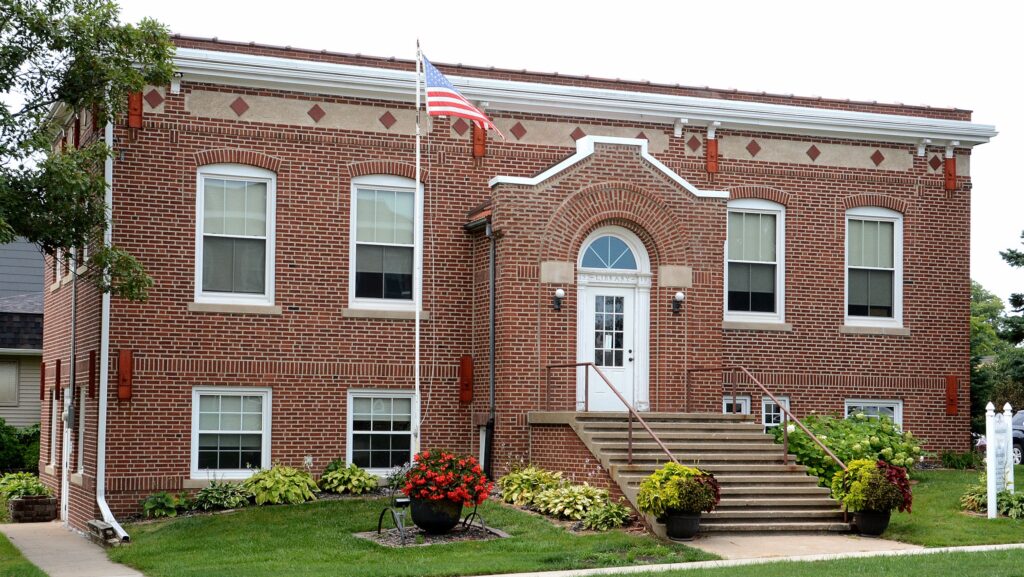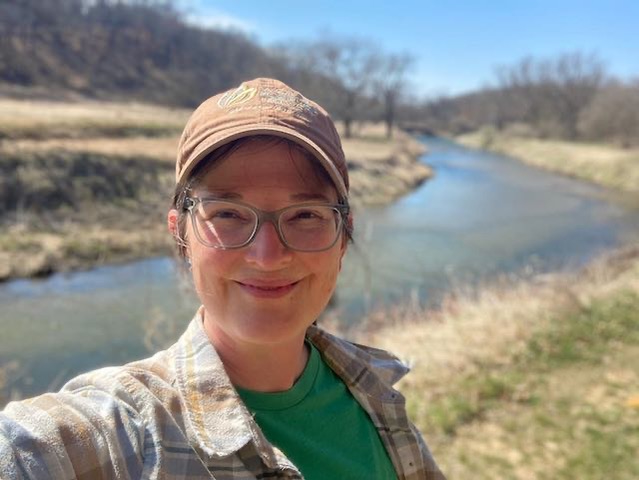
I grew up in small town Iowa during the 1980s. My town did not have a movie theater nor a water park, but we did have a library. It took me all of fifteen minutes to hop on my blue Schwinn, navigate the stop signs across two highways as I rode from the west edge of town to downtown, and hurry up the old Carnegie building’s many front steps.
Pulling open the Montezuma Public Library’s front wooden door took some muscle, a good heave. The reward was immediate. Sometimes I still smell that alchemy of dust, old books, and wood polish in used book shops, or the less frequented library stacks at public and university libraries, and am transported back to walking up the interior staircase of my childhood library. Mysterious and magical, the aroma foreshadows the many real and imaginary worlds where I’ve found refuge since my earliest memories as a reader.
The second set of doors at the top of the stairs opened into the library’s main collections. Tall rows of bookshelves housing adult fiction, nonfiction, and reference books stretched to the left. To the right, bright rugs and small tables with chairs welcomed children into a room featuring a fireplace. The librarian’s massive wooden desk stretched between the two, home to bookmarks, stickers, posters advertising library programs and community events, and, once, an advertisement seeking pen pals.

I immediately wrote away for three pen pals. Only two replied. They were both girls who liked to read and each had a younger brother, like me. One lived in France and one in a suburb somewhere in South Carolina. I remember the French pen pal’s stories of her class field trip to Normandy as well as the shopping mall and skating rink where my South Carolina pen pal and her friends spent weekends, but I forget their names.
I have a real passport now, but my library card was my first one. I believed it possible to read the entirety of that small Carnegie library’s holdings by adulthood. There must have been a time when I was content only spending time in the children’s section by the fireplace, but I don’t remember it.
In addition to books that adults might agree were age-appropriate – Shel Silverstein, Judy Blume, the Choose Your Own Adventure series, Ann Martin’s Baby-Sitter’s Club, and Carolyn Keene’s unflappable Nancy Drew – I also devoured Agatha Christie’s mysteries, Stephen King, Maya Angelou, Shakespeare, and Betty Smith’s A Tree Grows in Brooklyn. I read biographies of Sojourner Truth, Abraham Lincoln, Sacajawea, Joan of Arc, and Annie Oakley. I enjoyed histories of the Titanic, Union spies during the Civil War, and all the ghost or vampire stories I could get my hands on. My favorite discovery was a special edition of Tolkien’s Lord of the Rings series featuring elaborate, fold-out maps. My friend and next-door neighbor read them, too. The maps inspired us to spend an entire summer drawing up all sorts of imagined island nations and histories to accompany them.
Summers were my favorite time at the library because I had nowhere else to be and no one keeping very close track of me. I would sit cross-legged between the bookshelves with piles of books around me, flipping through the options. The size of my backpack limited the number of books I could check out at a time.
“Are you really going to read all those books?” an adult asked once as I stood at the librarian’s desk, watching her stamp the due date inside each one of my mighty pile. I don’t remember who it was, but it wasn’t the librarian – she knew me better. I remember looking up at this woman, face flushed, and clearly stating, “Yes, I do read them all.” After she left, I worried. Was there a limit I didn’t know about? Was I being greedy? But I always returned them on time! The librarian didn’t comment on it as I left with my stack that day. I can’t imagine what it would have been like if any of these books had been pulled from my hands.

My family didn’t vacation in other countries or go on cruises. I didn’t know anyone at the time whose family did. The old building where I fell in love with reading is home to the Poweshiek County Historical Society and Montezuma has a new library now, but our town didn’t have any museums when I lived there. There were no art galleries. I didn’t have the access a city kid or a rich kid might have to interact with many people whose lives were very much different from my own, or my family’s. But, in the time it took me to ascend the library’s steps and hunker down among its shelves, I traveled continents and centuries.
Iowa’s Republican legislators want you to believe that this library endangered me. They might judge the librarian and my parents as neglectful in allowing me such freedom to read. Recently, Alabama Republicans have introduced House Bill 4 proposing to jail librarians for shelving books that are “harmful to minors.” Iowa’s Republican legislators have not gone that far, yet, but the Heritage Foundation’s Project 2025 calls for registering such librarians as sex offenders. As outrageous as this all seems, these attacks are old news.
Earlier this spring, I came across Iowan Leanore Goodenow’s still timely retelling of her own encounters with book banning. Goodenow taught English in a 12-grade consolidated school in Argyle, Iowa in 1929. Two school board members were also members of the Ku Klux Klan. Goodenow was lucky to find an ally in the school board secretary, Lester Dumenil.
One day, Dumenil galloped down the road to a meeting in town. Klan members pulled him from his horse and severely beat him, just as they did the Catholics in town. Still, Dumenil encouraged Goodenow’s efforts to advocate for her students’ learning. Promoted to superintendent, Goodenow instituted a series of reforms to keep students on campus over the lunch hour and limit the KKK’s attempts to recruit them in town. Klansmen showed up at the next school board meeting with guns.
Still, Goodenow and the school board secretary continued in their efforts to stand up to the Klan. Goodenow ordered books from the State Traveling Library for her English classes because the Argyle school lacked a library. One Friday, a student reported to Goodenow that all his classmates had borrowed all the books and there were none left for him. The student eyed the copy of Knut Hamsun’s Growth of the Soil sitting on the corner of her desk. Goodenow had ordered it for herself. The student begged to borrow it and she sent it with him for the weekend. For this act, the student’s parent, a Klan member, argued that Goodenow should lose her job. There were inappropriate scenes in the book, the parent insisted! The school board called for a special meeting. Goodenow’s job was in jeopardy.

Undeterred, Goodenow attended the meeting and read passages of the book aloud. She doubted that any of the school board members had ever been read to, much less from such a moving story. “There’s worse things than that in the Bible,” replied one of the school board members. Indeed. Remember when Solomon proposed to cut a baby in half with a sword? Or when the protagonist of the New Testament, Jesus himself, is nailed to a cross and left to die? Goodenow was victorious in her stand against the Klan’s attempt to ban books. No one spoke to her again about the incident. They unanimously re-elected her superintendent the following year.
Fast forward 100 years and extremists in Iowa are again mad about what kids are reading. Today, Iowa’s white nationalists aren’t pulling school board secretaries off horses and beating them. They are not yet bringing their guns to school board meetings. They do speak freely from the highest levels of the state’s elected government, and they are working quickly to censor books.
Iowa Senate File 496 requires schools to remove books with depictions of sexual acts from K-12 libraries and classrooms, and prohibits education about gender identity and/or sexual orientation in kindergarten through sixth grades. Luckily, a federal judge blocked Iowa Senate File 496 in December 2023 while the legal challenges continue. Legislators swiftly continued their book banning efforts through two additional bills in the spring of 2024. Senate Study Bill 3131 would repeal the state law requiring that local governments levy taxes for public libraries, leaving many libraries defunded and forced to close. House Study Bill 678 would move library decision-making power from library boards to city councils.

Specifically, these legislators seem to believe that stories by and about LGBTQ people may somehow “turn” kids LGBTQ. My childhood obsession with vampire and ghost stories did bring me some bad dreams. I was a thrilling guest at slumber parties. I’m sure my retelling of how one becomes a vampire brought grief to tired parents who wished I was a little less knowledgeable on these subjects. But, try as I might, I never was able to turn myself into a supernatural creature. The best books are transformative. There is a difference, though, between the resonance of a story and actually becoming the characters. Kids understand this even if Republican legislators don’t.
My friend, Taylor Brorby, also found solace in books and libraries as a kid. As he recounts in his memoir Boys and Oil: Growing up Gay in a Fractured Land, the stakes for him were much higher. His childhood libraries provided refuge unavailable to him elsewhere as a gay boy growing up in rural North Dakota. I donated a copy of Taylor’s memoir to the Montezuma Public Library last year, in solidarity with all the kids looking to their libraries to learn or to feel a little less alone. Taylor reminds his audiences that a book cannot turn a kid gay, but a book can save a gay kid’s life.
Iowa’s Republicans are right on one point. Reading does change hearts and minds. Children are not immune from either. Books provide safe harbor to kids who may otherwise feel alone in their families, schools, and communities just because they are “different.” Reading about difference, may, God forbid, help kids develop empathy and even respect for others.

Have Iowans tried reading to their Republican legislators? I hope they do, but more so, I hope Iowans turn out in droves this fall to vote them out of office.
It’s not books these Republicans really fear, but the empowerment of any child, anywhere, who pulls open that library door.
 Photographs courtesy of Angie Carter, Roger Allen, Annie Spratt, Aaron Burden and Janine Calsbeek.
Photographs courtesy of Angie Carter, Roger Allen, Annie Spratt, Aaron Burden and Janine Calsbeek.
Copyright © 2024 by Angie Carter.
Sources: Goodenow, Leanore. 1995. My Encounters with the Ku Klux Klan. The Palimpsest, Summer: 52-55. https://pubs.lib.uiowa.edu/palimpsest/article/24649/galley/133018/view/
Angie Carter

Angie Carter is originally from Iowa and now lives in Michigan’s Upper Peninsula. She is an associate professor at Michigan Technological University and a board member of the Women, Food and Agriculture Network. The treehouse among the oaks and hickories in the pasture behind her childhood home remains her favorite reading spot.
